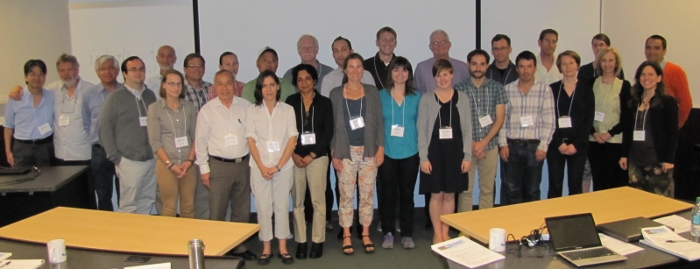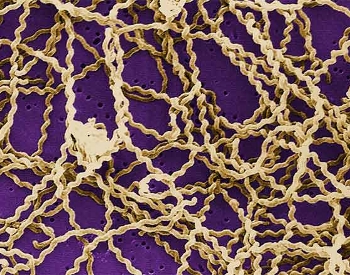| Description | Participants | Agenda | Summary | Products |
|---|
NIMBioS Investigative Workshop
Leptospirosis Modeling

Topic: Mathematical modeling of Leptospira infection, transmission, and intervention strategies
Meeting dates: June 3-5, 2014
Location: NIMBioS at the University of Tennessee, Knoxville
Organizers:
Claudia Munoz-Zanzi, Div. of Epidemiology and Community Health, School of Public Health, Univ. of Minnesota, Minneapolis
Michael Begon, Evolution, Ecology, and Behavior, Institute of Integrative Biology, Univ. of Liverpool
Xiaopeng Zhao, Mechanical, Aerospace and Biomedical Engineering, Univ. of Tennessee, Knoxville
Objectives: Leptospirosis is a zoonotic disease of global public health importance with complex transmission dynamics. This workshop explored mathematical tools and approaches for describing 1) within-host dynamics of Leptospira infection and immunity in reservoir and incidental hosts; 2) multi-host, multi-species Leptospira transmission dynamics in urban and rural settings; and 3) environmental drivers of leptospirosis transmission in animals and people. The workshop brought together expertise in bacteriology, molecular biology, epidemiology, statistics, veterinary medicine, human medicine, ecology, hydrology, mathematical modeling, network dynamics, evolutionary dynamics, and nonlinear analysis. Attendees explored the state of knowledge of leptospirosis transmission in animal and human populations and the capabilities and limitations of the existing techniques that could be used for explaining currently available empirical data. Recommendations were made on the need for further empirical studies as well as future directions for modeling and analysis. As a result of this workshop, we have an improved understanding of the conceptual models of Leptospira transmission in various ecological systems and of the gaps in data and methods. We also established new collaborations and a common language between biologists and theorists interested in leptospirosis.
Leptospirosis Modeling WordPress Site
Presentations were available for viewing via live streaming during the workshop.
Playlist of online videos
 Summary Report. This workshop reviewed the current state of knowledge and data gaps in leptospirosis transmission mechanisms, epidemiology, pathogen diversity, detection methods, and health impact in people and in animals. Through large and small group discussion, attendees explored key questions that could be investigated through mathematical modeling while considering various modeling approaches, data needs and gaps. Discussion was organized based on three general themes: 1) Leptospira transmission dynamics within and between animal populations, 2) Leptospira in the environment and the host-environment interface, and 3) large-scale spatial and temporal models for evaluation and identification of cost-effective public health interventions. The various opportunities for interaction allowed open discussions and the creation of new plans for formal and informal collaborations between attendees. Future plans include continuing specific modeling efforts that began during the workshop and submission of a NIMBioS Working Group application.
Summary Report. This workshop reviewed the current state of knowledge and data gaps in leptospirosis transmission mechanisms, epidemiology, pathogen diversity, detection methods, and health impact in people and in animals. Through large and small group discussion, attendees explored key questions that could be investigated through mathematical modeling while considering various modeling approaches, data needs and gaps. Discussion was organized based on three general themes: 1) Leptospira transmission dynamics within and between animal populations, 2) Leptospira in the environment and the host-environment interface, and 3) large-scale spatial and temporal models for evaluation and identification of cost-effective public health interventions. The various opportunities for interaction allowed open discussions and the creation of new plans for formal and informal collaborations between attendees. Future plans include continuing specific modeling efforts that began during the workshop and submission of a NIMBioS Working Group application.
Publications.
Gostic KM et al. 2019. Mechanistic dose-response modeling of animal challenge data shows that intact skin is a crucial barrier to leptospiral infection. Philosophical Transactions of the Royal Society, B.
[Link]
NIMBioS Investigative Workshops focus on broad topics or a set of related topics, summarizing/synthesizing the state of the art and identifying future directions. Workshops have up to 35 participants. Organizers and key invited researchers make up half the participants; the remaining participants are filled through open application from the scientific community. Open applicants selected to attend are notified by NIMBioS within two weeks of the application deadline. Investigative Workshops have the potential for leading to one or more future Working Groups. Individuals with a strong interest in the topic, including post-docs and graduate students, are encouraged to apply. If needed, NIMBioS can provide support (travel, meals, lodging) for Workshop attendees, whether from a non-profit or for-profit organization.
A goal of NIMBioS is to enhance the cadre of researchers capable of interdisciplinary efforts across mathematics and biology. As part of this goal, NIMBioS is committed to promoting diversity in all its activities. Diversity is considered in all its aspects, social and scientific, including gender, ethnicity, scientific field, career stage, geography and type of home institution. Questions regarding diversity issues should be directed to diversity@nimbios.org. You can read more about our Diversity Plan on our NIMBioS Policies web page. The NIMBioS building is fully handicapped accessible.
NIMBioS
1122 Volunteer Blvd., Suite 106
University of Tennessee
Knoxville,
TN 37996-3410
PH: (865) 974-9334
FAX: (865) 974-9461
Contact NIMBioS


